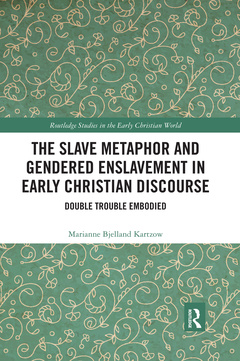The Slave Metaphor and Gendered Enslavement in Early Christian Discourse Double Trouble Embodied Routledge Studies in the Early Christian World Series
Auteur : Bjelland Kartzow Marianne

The Slave Metaphor and Gendered Enslavement in Early Christian Discourse adds new knowledge to the ongoing discussion of slavery in early Christian discourse. Kartzow argues that the complex tension between metaphor and social reality in early Christian discourse is undertheorized. A metaphor can be so much more than an innocent thought figure; it involves bodies, relationships, life stories, and memory in complex ways. The slavery metaphor is troubling since it makes theology of a social institution that is profoundly troubling. This study rethinks the potential meaning of the slavery metaphor in early Christian discourse by use of a variety of texts, read with a whole set of theoretical tools taken from metaphor theory and intersectional gender studies, in particular. It also takes seriously the contemporary context of modern slavery, where slavery has re-appeared as a term to name trafficking, gendered violence, and inhuman power systems.
Introduction; Chapter 1: Thinking with Saleable Bodies: An Intersectional Approach to the Slavery Metaphor; Chapter 2: Embodying the Slavery Metaphor: Female Characters and Slavery Language; Chapter 3: Metaphor and Masculinity: The "no longer slave" Formulations (John 15:15 and Gal 4:7); Chapter 4: The Paradox of Slavery: All Believers Are Slaves of the Lord, but Some Are More Slaves Than Others; Chapter 5: From Slave of a Female Owner to Slave of God: Negotiating Gender, Sexuality and Status in The Shepherd of Hermas; Chapter 6: Jesus, the Slave Trader: Metaphor made real in The Act of Thomas; Conclusion; Index
Marianne Bjelland Kartzow is Professor of New Testament Studies at the Faculty of Theology, University of Oslo, Norway
Date de parution : 08-2020
15.6x23.4 cm
Date de parution : 04-2018
15.6x23.4 cm
Thèmes de The Slave Metaphor and Gendered Enslavement in Early... :
Mots-clés :
Slavery Metaphor; Young Man; Slavery Metaphor in Early Christian Discourse; Vice Versa; slavery in early Christian discourse; Common Language; slavery in the early christian world; Real Slaves; intersectional gender studies and early christianity; Early Christian Discourse; early christianity and metaphor theory; Real Slavery; Female characters and slavery language; NT Text; Metaphorical Slave; slave metaphor; Free Women; slave metaphor in early christianity; Longer Slave; Shepard of Hermas; Early Christian Texts; Acts of Thomas; Patron Client Model; Marianne Bjelland Kartzow; NT Act; Female Slave; Key Cultural Figure; Wedding Banquet; Longer Event; Slavery System; Slave Girl; Slavery Experiences; Core Metaphor; Greco Roman Context; Joint Heir; Good Slave



